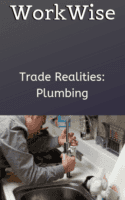Have you thought of doing a trade? Perhaps you don’t know too much about what tradespeople do? This week, I thought I’d find out more. I interviewed a plumber, James, from James Plumbing Service, to find out more about what it is like being a plumber.
A plumber is someone who is responsible for assembling, installing and repairing pipes, fittings and fixtures of heating, water, and drainage systems.
James’s phone was constantly ringing while we were chatting – business must be good – but he was happy to answer my questions while he waited for his order to be packed into his truck.
1. Why did you decide to become a plumber?
I spent a year and a half at university doing a commerce degree but I really wasn’t enjoying it. I found myself taking a course three times and still not getting the marks I needed! I realised that this wasn’t for me. My father was very insistent that I get a degree and told me I would get nowhere in life without one. But I eventually told him I was done with university and I’m very happy I made that decision.
2. What made you decide to become a plumber?
I’m a very hands-on person and like being involved with the job. I grew up fiddling with mechanics – my father worked on old cars – but I saw mechanics as a hobby and not something I wanted to do as a job. I knew that plumbing was a good way to make money so that played an important role in attracting me to the trade.
3. Where did you study?
I went to what was called Westlake Technical College – that was about 20 years ago. It’s called False Bay College now. I had matric but you only need a Grade 9 certificate to study to be a plumber.
4. What did you study in the course?
I was lucky because I had done matric maths so I didn’t even have to go to the maths lectures, but the others did. You need to understand some maths to work with builder’s drawings. The lectures also include science and plumbing theory. You do this for your N1 and N2 certificates.
5. Where you qualified to be a plumber after that?
No, I still needed to do an 18 months’ apprenticeship. I asked around until I found someone who would take me on as an apprentice. I didn’t earn lots of money then but after that I took my trade test and became a qualified plumber.
6. Have you been able to make a living out of being a plumber?
Definitely. I have made good money. I support a family of four. My wife is a stay-at-home mom and I have 2 children. I also employ 2 staff members as I run my own plumbing service. It really is a good living.
7. What are some of the negatives of your job?
It is physically hard work but I enjoy that. I have had a few injuries, but you could get something like carpal tunnel syndrome working at a desk! It can be rather weather dependent so if the weather is bad you might not be able to work that day unless you have inside work to complete. I wouldn’t work in a very cold country as it would be too cold outside for me! Don’t be a plumber if you can’t take heat either. Working on a geyser inside a roof can be very hot work – it can get up to 50 degrees or more in there at times!
8. Would you recommend plumbing to a young person?
Yes, definitely! There aren’t enough people training to be plumbers. When I took the course there were only 11 people doing it. There are so many opportunities for work as a plumber. There are online ads everywhere. I’ve done work overseas and I recently worked in Mozambique. What’s good about plumbing is that you can do it anywhere in the world – nothing really changes because the basics are always the same. Some countries like New Zealand and Australia are looking for plumbers and South Africa needs more plumbers too!
It seems as if plumbing could be a good trade to qualify in if you’re a hands-on person and are prepared to work hard!
There are a number of place you can train to be a plumber.
Here are some public TVET (Technical and Vocational Education and Training) colleges that offer a plumbing qualification:
• Northlink College
Belhar, Cape Town
Website: www.northlink.co.za
• False Bay College
Muizenberg and Khayelitsha
Website: www.falsebaycollege.co.za
• College of Cape Town
Cape Town
Website: www.cct.edu.za
• Flavius Mareka
Sasolburg
Website: www.flaviusmareka.net
• Ekurhuleni East College
Springs, Gauteng
Website: www.eec.edu.za
• Umfolozi College
Richards Bay, KwaZulu Natal
Website: www.umfolozicollege.co.za
There are some private colleges that offering plumbing courses. You need to check that private colleges are properly accredited to provide you with a recognised plumbing qualification. Here are some private colleges recommended by the IOPS (Institute of Plumbing SA):
• MAASA
East London
Website: www.maasa.co.za
• Africa International Training Facilities
Bredell, Gauteng
Website: www.aitf.co.za
• Tjeka Training Matters
Krugersdorp, Gauteng
Website: www.tjeka.co.za
• Africa Skills Village Training and Management Services
George, Southern Cape
Website: www.africaskills.co.za
• PCD College (Pty) Ltd
Pretoria, Gauteng
Website: www.pcdcollege.co.za
NSFAS (National Student Financial Aid Scheme) is available to qualifying individuals who study at a TVET college. From 2019, NSFAS agreed to pay the registration or first fee instalment for all NSFAS qualifying students therefore students did not need to pay any registration or upfront fees at the beginning of the year.
If you are interested in becoming a plumber, apply to a college near you. If you need funding, follow the procedures on the NSFAS website to find out if you qualify for funding.
Tell us: what other trades would you like to know about?



